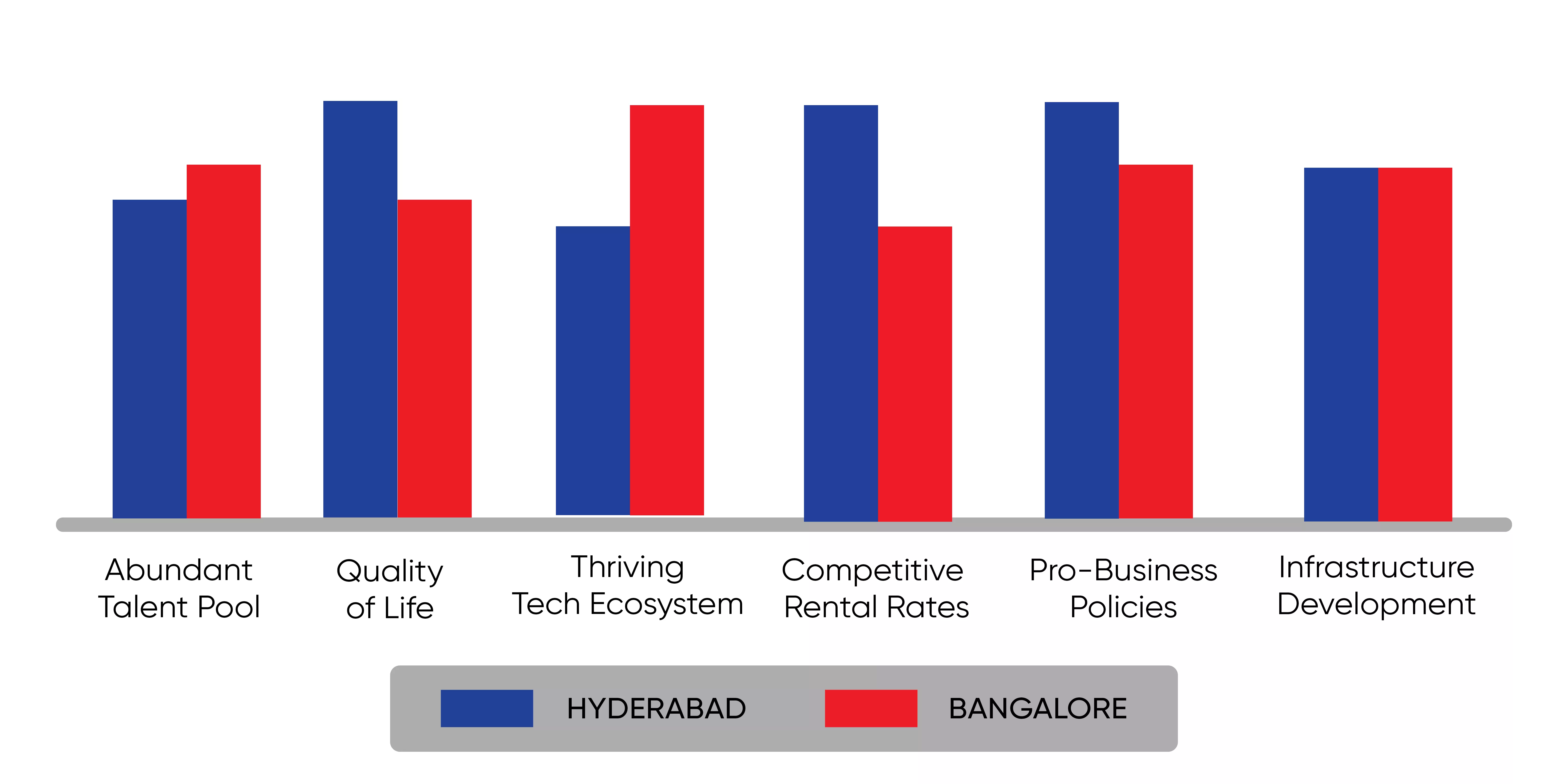In recent years, the Indian real estate landscape has witnessed a significant shift in the office space market. While Bengaluru has long been considered the Silicon Valley of India and the undisputed leader in the tech industry, Hyderabad is emerging as a formidable contender for the top spot. This shift is driven by various factors, including infrastructure development, favorable policies, and a growing tech ecosystem. In this blog, we will explore how Hyderabad's growing office space market is challenging Bengaluru's top spot.
Bangalore vs Hyderabad - Infrastructure Development:
One of the key factors driving Hyderabad's rise in the office space market is its robust infrastructure development. According to recent data, Hyderabad's infrastructure investments have been substantial, with over ₹10,000 crores (approximately $1.3 billion) allocated for infrastructure projects in the city. This includes the expansion of the Hyderabad Metro, the development of the Outer Ring Road (ORR), and the modernization of the Shamshabad Airport. These investments have significantly improved connectivity and accessibility, making Hyderabad an attractive destination for businesses.
On the other hand, Bengaluru has been grappling with infrastructural challenges. According to a report by the Bengaluru Traffic Police, the city loses over ₹38,000 crores (approximately $5 billion) annually due to traffic congestion. This can be a deterrent for businesses looking for efficient operations.
Pro-Business Policies:
Hyderabad has adopted a pro-business approach through investor-friendly policies and incentives. According to government statistics, the Telangana government's TS-iPASS initiative has led to a 32% increase in the number of industries in the state. Additionally, the state government has offered various incentives, including subsidies and tax breaks, to attract investments.
In contrast, Bengaluru's regulatory environment has faced challenges due to bureaucracy and complex approval processes. According to a survey by the Confederation of Indian Industry (CII), 67% of businesses in Bengaluru reported delays in obtaining necessary approvals, impacting their expansion plans.
Competitive Rental Rates:
Hyderabad offers competitive rental rates compared to Bengaluru, which is an attractive proposition for businesses. According to data from real estate consultancy firms, the average rental rates for Grade A office spaces in Hyderabad are approximately ₹60-70 per square foot per month, whereas in Bengaluru, the rates can range from ₹80-100 per square foot per month. This cost advantage allows companies in Hyderabad to allocate resources to other essential aspects of their operations.
Bengaluru, on the other hand, has seen soaring rental rates due to high demand and limited supply. According to multiple reports, the city witnessed an 11-13% increase in office rental rates in the past year, putting pressure on businesses to allocate a significant portion of their budgets to office space.
Thriving Tech Ecosystem:
Both Hyderabad and Bengaluru boast thriving tech ecosystems with a strong presence of IT giants and startups. However, Hyderabad's strategic initiatives to foster innovation and entrepreneurship have gained momentum. According to the National Association of Software and Service Companies (NASSCOM), Hyderabad witnessed a 47% growth in the number of startups in the last two years, making it one of the fastest-growing startup ecosystems in India.
While Bengaluru continues to be a hub for tech innovation, the competition for resources and talent has become intense. According to NASSCOM's data, Bengaluru still leads in terms of the number of startups, but the rapid growth of Hyderabad's tech ecosystem is challenging the status quo.
Quality of Life:
Hyderabad offers an excellent quality of life with a lower cost of living compared to Bengaluru. According to Numbeo, a popular cost of living database, the cost of living in Hyderabad is 30% lower than in Bengaluru. This includes lower housing costs, transportation expenses, and overall living expenses. The city's pleasant weather, affordable housing options, and vibrant cultural scene make it an attractive destination for professionals and their families.
Bengaluru, while known for its cosmopolitan lifestyle, has witnessed rising living costs, traffic congestion, and environmental concerns. According to Mercer's Quality of Living Survey, Hyderabad ranks higher than Bengaluru in terms of quality of life.
Abundant Talent Pool:
Hyderabad has been steadily building a robust talent pool, which is crucial for the success of any tech-oriented office space market. According to government reports, Telangana has seen consistent growth in engineering colleges and technical institutions, producing a steady influx of skilled professionals. This talent pool particularly appeals to tech companies looking to expand their operations. In fact, as per government data, Telangana produced over 1.3 lakh (130,000) engineering graduates in the academic year 2020-21.
In Bengaluru, while the talent pool remains extensive, the competition for talent has intensified. The city's long-standing reputation has attracted professionals from all over the country, increasing competition for top talent and potentially driving labor costs upwards.
Conclusion:

Hyderabad's growing office space market is increasingly challenging Bengaluru's position as the top choice for businesses in India. With sturdy infrastructure, pro-business policies, competitive rentals, thriving tech ecosystem, and high quality of life, Hyderabad has become a top alternative for companies looking to establish their presence in India. According to government reports, the Telangana government's initiatives have resulted in an increase of 32% in the number of industries in the state, highlighting the effectiveness of its pro-business policies.
While Bengaluru still retains its significance in the tech industry, it is clear that Hyderabad is rising as a formidable competitor, offering new opportunities for businesses and professionals alike. As Indian real estate continues to evolve, Hyderabad's rise is a trend worth keeping a close eye on. The data supports the view that Hyderabad's office space market is on the verge of challenging Bengaluru's dominance, and businesses should carefully consider the advantages it offers for their future growth.
Recent Blogs

